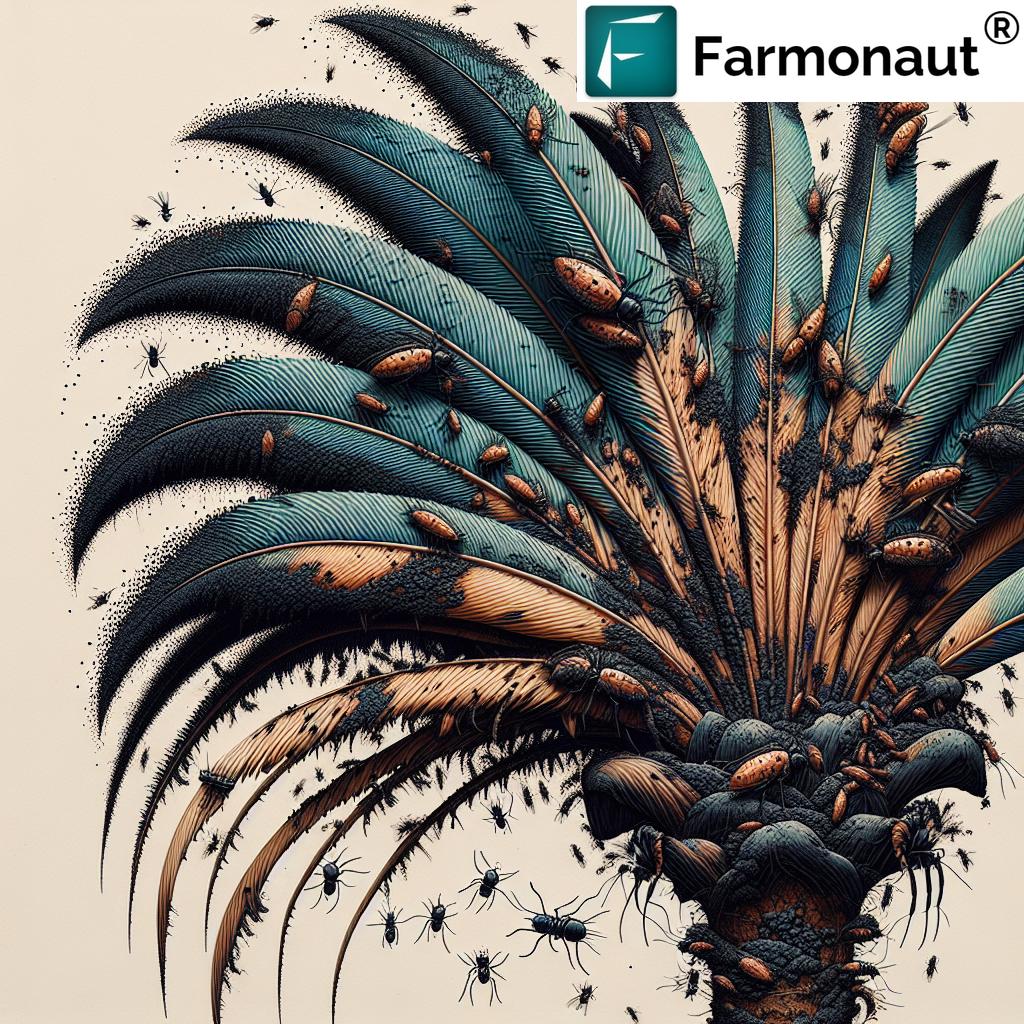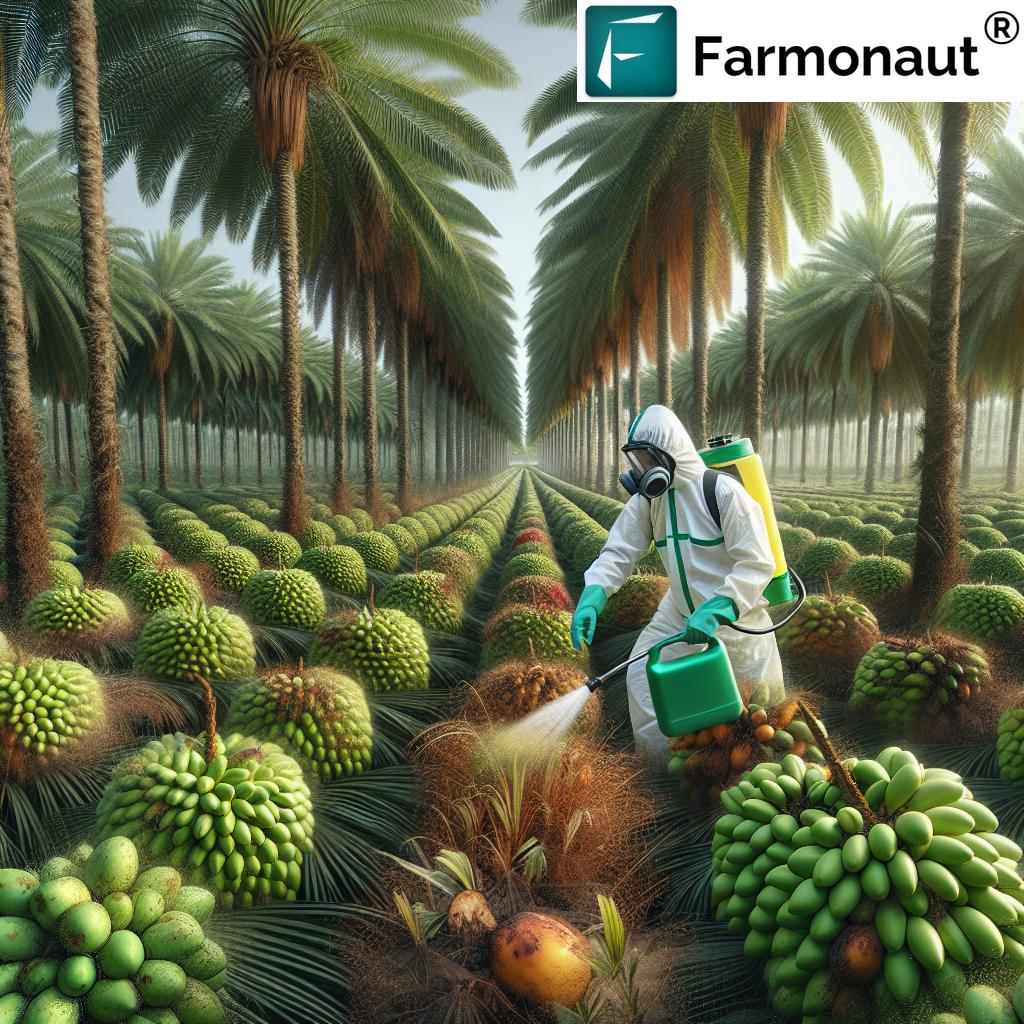Effective Pest Control: Protecting Palm Plantations from Insect Infestations and Boosting Crop Yields

In the world of agriculture, palm plantations face numerous challenges, but one of the most persistent and damaging is pest infestation. At Farmonaut, we understand the critical importance of effective pest control in maintaining healthy palm trees and ensuring optimal crop yields. In this comprehensive guide, we’ll explore the intricacies of pest management in palm plantations, focusing on the most common insect pests, their life cycles, and the innovative solutions we offer to combat these threats.
Understanding Palm Plantation Pests
Palm trees, whether cultivated for oil, dates, or ornamental purposes, are susceptible to a variety of insect pests. These pests can cause significant damage to different parts of the palm, including the fronds, leaves, fruit clusters, and even the trunk. Let’s delve into some of the most problematic insects that plague palm plantations:
- Red Palm Weevil
- Coconut Rhinoceros Beetle
- Palm Leaf Skeletonizer
- Mealybugs
- Scale Insects
Each of these pests has unique characteristics and life cycles, often involving stages from eggs to nymphs and finally adults. Understanding these stages is crucial for implementing effective control measures.
The Impact of Pest Infestations on Palm Plantations
Pest infestations can have devastating effects on palm plantations, leading to:
- Reduced photosynthesis due to damaged fronds and leaves
- Weakened tree structure, making palms more susceptible to wind damage
- Decreased fruit production and quality
- Increased vulnerability to secondary infections and diseases
- Ultimately, significant economic losses due to reduced crop yields
One particularly insidious effect of certain pests, such as mealybugs and scale insects, is the production of honeydew. This sticky substance not only attracts other pests but also promotes the growth of sooty mold, a black fungus that further impairs photosynthesis by blocking sunlight from reaching the leaves.
Traditional Pest Monitoring vs. Farmonaut’s Satellite-Based Detection
To better understand the advantages of our innovative approach, let’s compare traditional pest monitoring methods with Farmonaut’s satellite-based detection system:
| Aspect | Traditional Methods | Farmonaut’s Satellite-Based Detection |
|---|---|---|
| Detection Speed | Slow – relies on manual inspection | Fast – uses real-time satellite imagery |
| Accuracy | Variable – depends on inspector’s expertise | High – utilizes advanced AI algorithms |
| Coverage Area | Limited – time-consuming for large plantations | Extensive – can monitor vast areas simultaneously |
| Cost-effectiveness | Low – requires significant labor and time | High – reduces need for on-ground personnel |
As demonstrated in the table, our satellite-based system offers significant advantages in early detection across large palm plantations, enabling timely interventions and improved crop yields.
Farmonaut’s Innovative Approach to Pest Control
At Farmonaut, we leverage cutting-edge technology to revolutionize pest control in palm plantations. Our satellite-based crop health monitoring system provides several key benefits:
- Early detection of pest infestations through analysis of multispectral imagery
- Precise mapping of affected areas within the plantation
- Real-time alerts to plantation managers for rapid response
- Historical data analysis to predict and prevent future outbreaks
- Integration with our Jeevn AI Advisory System for personalized pest management strategies
By utilizing our advanced technology, palm plantation managers can implement targeted pest control measures, reducing the need for widespread pesticide application and minimizing environmental impact.
Implementing Effective Pest Control Strategies
While early detection is crucial, it’s equally important to have a comprehensive pest control strategy in place. Here are some key components of an effective pest management plan for palm plantations:
- Cultural Control: Maintain proper plantation hygiene, including removal of dead fronds and infected plant material.
- Biological Control: Introduce natural predators or parasites of palm pests to keep populations in check.
- Chemical Control: Use targeted, environmentally friendly pesticides when necessary, guided by our AI-driven recommendations.
- Pheromone Traps: Deploy traps to monitor and control adult insect populations.
- Resistant Varieties: Plant palm varieties that show natural resistance to common pests.
Our Jeevn AI Advisory System integrates these strategies with real-time data from our satellite monitoring to provide customized pest control recommendations for each plantation.
Case Study: Combating Red Palm Weevil Infestation
To illustrate the effectiveness of our approach, let’s examine a hypothetical case study of a palm plantation dealing with a Red Palm Weevil infestation:
- Detection: Our satellite imagery detected anomalies in palm health across a 500-hectare plantation.
- Analysis: The Jeevn AI system identified the patterns as consistent with early-stage Red Palm Weevil infestation.
- Alert: Plantation managers received immediate notifications with affected area maps.
- Response: Guided by our AI recommendations, managers implemented a targeted treatment plan, including pheromone traps and localized pesticide application.
- Monitoring: Continuous satellite monitoring tracked the effectiveness of the interventions.
- Outcome: The infestation was contained within weeks, with minimal spread and limited use of pesticides.
This proactive approach not only saved a significant portion of the crop but also reduced overall pesticide use and environmental impact.
The Future of Pest Control in Palm Plantations
As we look to the future, Farmonaut is committed to pushing the boundaries of pest control technology. Some exciting developments on the horizon include:
- Integration of drone technology for even more detailed pest monitoring
- Advanced AI models for predicting pest outbreaks based on environmental factors
- Development of pest-resistant palm varieties through genetic research
- Expansion of our blockchain-based traceability system to track pest control measures and ensure compliance with international standards
By staying at the forefront of agricultural technology, we aim to provide palm plantation owners with increasingly effective tools to protect their crops and maximize yields.
Conclusion
Effective pest control is essential for the success and sustainability of palm plantations. At Farmonaut, we’re dedicated to providing innovative, technology-driven solutions that empower plantation managers to detect, respond to, and prevent pest infestations more efficiently than ever before. By combining satellite imagery, AI analysis, and expert agricultural knowledge, we’re helping to secure the future of palm cultivation worldwide.
To learn more about how Farmonaut can help protect your palm plantation from pest infestations and boost your crop yields, visit our website or contact our team of experts today.
FAQs
- Q: How often should I monitor my palm plantation for pests?
A: With Farmonaut’s satellite-based system, monitoring is continuous. However, we recommend reviewing reports at least weekly and conducting on-ground inspections monthly or as alerted by our system. - Q: Can Farmonaut’s system detect all types of palm pests?
A: While our system can detect signs of most common palm pests, some infestations may not be visible from satellite imagery alone. Our AI system is continuously improving to recognize more subtle indicators of pest presence. - Q: Is Farmonaut’s pest control system suitable for small-scale palm growers?
A: Yes, we offer scalable solutions suitable for plantations of all sizes. Our pricing tiers are flexible to accommodate different needs and budgets. - Q: How does Farmonaut’s system handle mixed plantations with other crops besides palms?
A: Our system is capable of distinguishing between different crop types and can provide pest monitoring for various crops within the same plantation. - Q: Can Farmonaut’s pest control recommendations be integrated with existing farm management software?
A: Yes, we offer API access that allows integration of our data and recommendations with many popular farm management systems. For more information, visit our API documentation.
Ready to revolutionize pest control in your palm plantation? Try Farmonaut today!
Download for Android
Download for iOS
